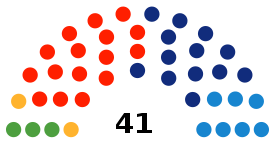Barcelona City Council election, 1995
|
| |||||||||||||||||||||||||||||||||||||||||||||||||||||||||||||||||||||||||||
| |||||||||||||||||||||||||||||||||||||||||||||||||||||||||||||||||||||||||||
All 41 seats in the City Council of Barcelona 21 seats needed for a majority | |||||||||||||||||||||||||||||||||||||||||||||||||||||||||||||||||||||||||||
|---|---|---|---|---|---|---|---|---|---|---|---|---|---|---|---|---|---|---|---|---|---|---|---|---|---|---|---|---|---|---|---|---|---|---|---|---|---|---|---|---|---|---|---|---|---|---|---|---|---|---|---|---|---|---|---|---|---|---|---|---|---|---|---|---|---|---|---|---|---|---|---|---|---|---|---|
| Opinion polls | |||||||||||||||||||||||||||||||||||||||||||||||||||||||||||||||||||||||||||
| Registered |
1,368,148 | ||||||||||||||||||||||||||||||||||||||||||||||||||||||||||||||||||||||||||
| Turnout |
906,038 (66.2%) | ||||||||||||||||||||||||||||||||||||||||||||||||||||||||||||||||||||||||||
| |||||||||||||||||||||||||||||||||||||||||||||||||||||||||||||||||||||||||||
| |||||||||||||||||||||||||||||||||||||||||||||||||||||||||||||||||||||||||||
The 1995 Barcelona City Council election, also the 1995 Barcelona municipal election, was held on Sunday, 28 May 1995, to elect the 5th City Council of the municipality of Barcelona. All 41 seats in the City Council were up for election. The election was held simultaneously with regional elections in thirteen autonomous communities and local elections all throughout Spain.
The unveiling of numerous corruption scandals throughout 1994 affecting Felipe González's Socialist government marked the electoral campaign. For the first time in 16 years, a real possibility for change in the local government resulted in a heated race between Socialists' Party of Catalonia (PSC) candidate and incumbent Mayor Pasqual Maragall and Convergence and Union (CiU) candidate Miquel Roca. Another factors influencing the political debate were the People's Party (PP) rise in opinion polls as well as Republican Left of Catalonia (ERC) recovery.
The election resulted in a surprising comfortable win for PSC and Pasqual Maragall, which was elected for a fourth consecutive term in office with 16 seats and 38.4%. On the other hand, CiU suffered from the PP growth and obtained its worst result since 1983, winning 13 seats and 30.6%. The People's Party nearly doubled its 1991 result with 7 seats and 16.6%, while both Initiative for Catalonia (IC) and ERC improved their electoral performances, with the latter narrowly surpassing the 5% threshold to enter the City Council.
Electoral system
The City Council of Barcelona (Catalan: Ajuntament de Barcelona, Spanish: Ayuntamiento de Barcelona) was the top-tier administrative and governing body of the municipality of Barcelona, composed of the mayor, the government council and the elected plenary assembly. Voting for the local assembly was on the basis of universal suffrage, which comprised all nationals over eighteen, registered in the municipality of Barcelona and in full enjoyment of their political rights, as well as resident non-nationals whose country of origin allowed Spanish nationals to vote in their own elections by virtue of a treaty.[1][2][3]
Local councillors were elected using the D'Hondt method and a closed list proportional representation, with a threshold of 5 percent of valid votes—which included blank ballots—being applied. Parties not reaching the threshold were not taken into consideration for seat distribution.[1][2][3] Councillors were allocated to municipal councils based on the following scale:
| Population | Councillors |
|---|---|
| <250 | 5 |
| 251–1,000 | 7 |
| 1,001–2,000 | 9 |
| 2,001–5,000 | 11 |
| 5,001–10,000 | 13 |
| 10,001–20,000 | 17 |
| 20,001–50,000 | 21 |
| 50,001–100,000 | 25 |
| >100,001 | +1 per each 100,000 inhabitants or fraction +1 if total is an even number |
The mayor was indirectly elected by the plenary assembly. A legal clause required that mayoral candidates earned the vote of an absolute majority of councillors, or else the candidate of the most-voted party in the assembly was to be automatically appointed to the post. In case of a tie, a toss-up would determine the appointee.[3]
The electoral law provided that parties, federations, coalitions and groupings of electors were allowed to present lists of candidates. However, groupings of electors were required to secure the signature of a determined amount of the electors registered in the municipality for which they sought election. For the case of Barcelona, as its population was over 1,000,001, at least 8,000 signatures were required. Electors were barred from signing for more than one list of candidates. Concurrently, parties and federations intending to enter in coalition to take part jointly at an election were required to inform the relevant Electoral Commission within ten days of the election being called.[1][2]
Opinion polls
Vote
Poll results are listed in the table below in reverse chronological order, showing the most recent first, and using the date the survey's fieldwork was done, as opposed to the date of publication. If such date is unknown, the date of publication is given instead. The highest percentage figure in each polling survey is displayed in bold, and the background shaded in the leading party's colour. In the instance that there is a tie, then no figure is shaded. The lead column on the right shows the percentage-point difference between the two parties with the highest figures. When a specific poll does not show a data figure for a party, the party's cell corresponding to that poll is shown empty.
| Date | Polling Firm/Source | PSC | CiU | PPC | ICV | ERC | Others | Lead |
|---|---|---|---|---|---|---|---|---|
| 28 May 1995 | Municipal Election | 38.4 | 30.6 | 16.6 | 7.6 | 5.1 | 1.7 | 7.8 |
| Exit polls | ||||||||
| 18–19 May | Vox Pública | 34.2 | 32.0 | 15.2 | 10.2 | 4.4 | 4.0 | 2.2 |
| 17 May | Opina | 37.9 | 35.3 | 11.1 | 8.8 | 4.0 | 2.9 | 2.6 |
| 18 Apr | Opina | 38.0 | 40.0 | 8.5 | 7.0 | 5.0 | 1.5 | 2.0 |
| 29–30 Mar | Vox Pública | 31.9 | 37.6 | 13.1 | 8.8 | 4.5 | 4.1 | 5.7 |
| 1995 | ||||||||
| 12–13 Dec | Opina | 38.1 | 39.3 | 9.8 | 7.8 | 5.0 | 0.0 | 1.2 |
| 6 Nov | Avui | 34.8 | 35.8 | 29.4 | 1.0 | |||
| 1994 | ||||||||
| 1993 | ||||||||
| 1992 | ||||||||
| 26 May 1991 | Municipal Election | 42.9 | 34.1 | 9.8 | 6.4 | 2.6 | 4.2 | 8.8 |
Seats
Opinion polls showing seat projections are displayed in the table below. The highest seat figures in each polling survey have their background shaded in the leading party's colour. In the instance that there is a tie, then no figure is shaded. 68 seats were required for an absolute majority in the Parliament of Catalonia.
| Date | Polling Firm/Source | PSC | CiU | PPC | ICV | ERC | Others |
|---|---|---|---|---|---|---|---|
| 28 May 1995 | Municipal Election | 16 | 13 | 7 | 3 | 2 | 0 |
| Exit polls | |||||||
| 18–19 May | Vox Pública | 15 / 16 | 14 / 15 | 7 | 4 | 0 | 0 |
| 17 May | Opina | 16 / 17 | 15 / 16 | 5 | 3 / 4 | 0 | 0 |
| 18 Apr | Opina | 15 / 16 | 16 / 17 | 4 / 5 | 3 / 4 | 0 / 2 | 0 |
| 29–30 Mar | Vox Pública | 14 / 15 | 17 | 5 / 6 | 4 | 0 | 0 |
| 20 Feb | Atelier-V | 15 | 15 | 8 | 2 | 1 | 0 |
| 1995 | |||||||
| 12–13 Dec | Opina | 16 / 17 | 17 | 4 | 3 | 0 / 1 | 0 |
| 6 Nov | Avui | 16 / 17 | 16 / 18 | 6 / 7 | 3 | 0 / 2 | 0 |
| 1994 | |||||||
| 1993 | |||||||
| 1992 | |||||||
| 26 May 1991 | Municipal Election | 20 | 16 | 4 | 3 | 0 | 0 |
Results
 | |||||||||
| Parties and coalitions | Popular vote | Seats | |||||||
|---|---|---|---|---|---|---|---|---|---|
| Votes | % | ±pp | Total | +/− | |||||
| Socialists' Party of Catalonia (PSC–PSOE) | 347,083 | 38.39 | –4.56 | 16 | –4 | ||||
| Convergence and Union (CiU) | 276,276 | 30.56 | –3.50 | 13 | –3 | ||||
| People's Party (PP) | 150,284 | 16.62 | +6.83 | 7 | +3 | ||||
| Initiative for Catalonia–The Greens (IC–EV) | 68,813 | 7.61 | +1.19 | 3 | ±0 | ||||
| Republican Left of Catalonia (ERC) | 46,272 | 5.12 | +2.55 | 2 | +2 | ||||
| Ecologist Alternative of Catalonia (AEC)1 | 3,304 | 0.37 | –0.16 | 0 | ±0 | ||||
| Democratic and Social Centre (CDS) | 1,256 | 0.14 | –0.70 | 0 | ±0 | ||||
| Revolutionary Workers' Party (POR) | 726 | 0.08 | +0.01 | 0 | ±0 | ||||
| Civic Platform–New Socialist Party (PC–NPS) | 571 | 0.06 | New | 0 | ±0 | ||||
| Workers' Revolutionary Party (PRT)2 | 376 | 0.04 | –0.13 | 0 | ±0 | ||||
| Platform of Independents of Spain (PIE) | 320 | 0.04 | New | 0 | ±0 | ||||
| Humanist Platform (PH)3 | 298 | 0.03 | –0.77 | 0 | ±0 | ||||
| European Nation State (N) | 181 | 0.02 | New | 0 | ±0 | ||||
| Blank ballots | 8,263 | 0.91 | –0.01 | ||||||
| Total | 904,023 | 41 | –2 | ||||||
| Valid votes | 904,023 | 99.78 | +0.08 | ||||||
| Invalid votes | 2,015 | 0.22 | –0.08 | ||||||
| Votes cast / turnout | 906,038 | 66.22 | +10.71 | ||||||
| Abstentions | 462,110 | 33.78 | –10.71 | ||||||
| Registered voters | 1,368,148 | ||||||||
| Sources[4][5][6][7] | |||||||||
| |||||||||
References
- 1 2 3 "General Electoral System Organic Law of 1985". Organic Law No. 5 of 19 June 1985. Official State Gazette (in Spanish). Retrieved 28 December 2016.
- 1 2 3 "Representation of the people Institutional Act". juntaelectoralcentral.es. Central Electoral Commission. Retrieved 16 June 2017.
- 1 2 3 "Regulation of the Basis of Local Regimes Law of 1985". Law No. 7 of 2 April 1985. Official State Gazette (in Spanish). Retrieved 27 August 2017.
- ↑ "Election Results. Municipal Elections 1995. Barcelona". gencat.cat (in Catalan). Generalitat of Catalonia. Retrieved 12 November 2017.
- ↑ "Local election results, 28 May 1995" (PDF). juntaelectoralcentral.es (in Spanish). Central Electoral Commission. Retrieved 16 February 2018.
- ↑ "Electoral Results Consultation. Municipal. May 1995. Barcelona Municipality". infoelectoral.mir.es (in Spanish). Ministry of the Interior. Retrieved 12 November 2017.
- ↑ "Municipal elections in Barcelona since 1979". historiaelectoral.com (in Spanish). Electoral History. Retrieved 30 September 2017.
.jpg)
.jpg)

.jpg)